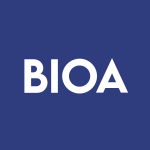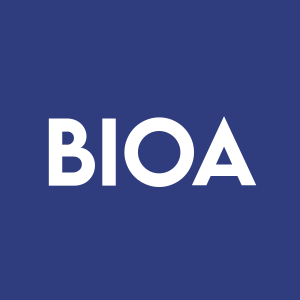Welcome to our dedicated page for BioAge Labs news (Ticker: BIOA), a resource for investors and traders seeking the latest updates and insights on BioAge Labs stock.
BioAge Labs Inc. (BIOA) is a clinical-stage biopharmaceutical company developing therapies targeting aging biology to treat metabolic diseases and neuroinflammation. This page provides investors and industry professionals with verified updates on the company’s progress, including clinical trial developments, strategic partnerships, and regulatory milestones.
Access the latest press releases and news articles covering BIOA’s pipeline advancements, such as its apelin receptor agonist Azelaprag (BGE-105) for obesity and BGE-100 for neuroinflammatory conditions. Stay informed about preclinical research outcomes, financial disclosures, and collaborations shaping the company’s innovative approach to age-related diseases.
Key updates include trial phase results, FDA communications, and analyses of BIOA’s unique position in the competitive biopharma landscape. Bookmark this page for real-time insights into how BioAge Labs leverages aging biology to address complex health challenges.
BioArctic AB (BIOA) has received regulatory approval in Spain and Poland to expand its EXIST Phase 2a study of exidavnemab to include Multiple System Atrophy (MSA) patients. The study will now add 12 MSA patients to the existing 24 Parkinson's Disease participants.
Exidavnemab is a monoclonal antibody targeting alpha-synuclein aggregates, being developed as a potential disease-modifying treatment for neuronal synuclein diseases. The study will evaluate safety, tolerability, and various biomarkers in plasma, cerebrospinal fluid, and through digital measurements.
MSA is described as a rapidly progressive and fatal rare disease affecting the central and autonomic nervous systems, with no current cure or treatment to slow progression. The condition impacts basic functions including breathing, digestion, and bladder control.
BioAge Labs (BIOA) reported its Q1 2025 financial results and business updates, highlighting progress in its metabolic disease therapeutics pipeline. The company's lead candidate BGE-102, an oral brain-penetrant NLRP3 inhibitor for obesity, is advancing with initial Phase 1 data expected in H2 2025. BioAge announced a strategic collaboration with Lilly ExploR&D to develop therapeutic antibodies and continues to advance its APJ agonist program for obesity.
Financial results show R&D expenses increased to $11.1 million from $9.3 million YoY, while G&A expenses rose to $6.8 million from $3.5 million. The company reported a net loss of $12.9 million ($0.36 per share). BioAge maintains a strong financial position with $335.1 million in cash and equivalents, expected to fund operations through 2029.
BioArctic AB (BIOA) announced that the European Commission (EC) has referred the marketing authorization approval decision for lecanemab, their Alzheimer's treatment, to the Appeal Committee. This follows the positive opinion received from the Committee for Medicinal Products for Human Use (CHMP) in February 2025.
If approved, the authorization would extend to all 27 EU member states, plus Iceland, Liechtenstein, and Norway. The drug, marketed as Leqembi, is already approved in several major markets including the US, Japan, China, and Great Britain.
Leqembi was developed through a collaboration between BioArctic and Eisai, based on Professor Lars Lannfelt's discovery of the Arctic mutation in Alzheimer's disease. While Eisai manages clinical development and global commercialization, BioArctic retains rights to commercialize Leqembi in the Nordic region jointly with Eisai.
BioArctic AB (NASDAQ Stockholm: BIOA B) announced that its partner Eisai has released sales projections for Leqembi®. According to Eisai's simulation, Leqembi sales are expected to reach JPY 250 to 280 billion for their financial year 2027, ending March 2028.
BioAge Labs (BIOA) reported its full year 2024 financial results and Q4 business updates. The company discontinued its STRIDES Phase 2 trial of azelaprag due to unexpected liver issues but continues developing next-generation APJ agonists for obesity. BGE-102, their oral brain-penetrant NLRP3 inhibitor, was nominated as a development candidate with Phase 1 data expected in 2H25.
The company secured strategic collaborations with Novartis ($20M upfront plus up to $530M in milestones) and Lilly for novel therapeutic development. Financial results showed R&D expenses of $59.0M (up from $33.9M in 2023) and G&A expenses of $19.2M (up from $14.5M). Net loss was $71.1M or $6.63 per share.
BioAge maintains a strong financial position with $354.3M in cash, expected to fund operations through 2029.
BioArctic AB (Nasdaq Stockholm: BIOA B) has received Orphan Drug Designation from the US FDA for exidavnemab, targeting the treatment of Multiple System Atrophy (MSA). MSA is a rare, fatal disease affecting the central and autonomic nervous systems, characterized by alpha-synuclein aggregation that damages brain nerve cells.
Exidavnemab is being developed as a disease-modifying treatment for synucleinopathies including MSA and Parkinson's disease. As a monoclonal antibody, it selectively targets soluble alpha-synuclein aggregates to potentially reduce their spreading and negative effects.
The FDA's Orphan Drug Designation provides several benefits, including:
- Tax credits for qualified clinical trials
- Prescription drug user-fee exemptions
- Potential seven-year marketing exclusivity upon FDA approval
BioArctic AB (Nasdaq Stockholm: BIOA B) founders Lars Lannfelt and Pär Gellerfors, along with CEO Gunilla Osswald, have been awarded Uppsala University's Innovation and Entrepreneurship Prize 2025 for their groundbreaking work in Alzheimer's disease treatment.
The recognition stems from Lannfelt's 1990s breakthrough in understanding Alzheimer's disease and developing an antibody-based treatment. The company, founded in 2003, partnered with Japanese pharmaceutical company Eisai to develop lecanemab, which is now approved in eleven countries including the USA, Japan, and China, with pending approvals in 17 additional countries and regions, including Europe.
The founders' vision includes building BioArctic into a fully-fledged pharmaceutical company in Sweden, focusing on both research and product commercialization. Gunilla Osswald, CEO since 2014, has been instrumental in realizing this vision of helping patients worldwide.
BioArctic AB (NASDAQ: BIOA B) announced that Australia's Therapeutic Goods Administration (TGA) has declined to approve lecanemab for early Alzheimer's disease treatment. The TGA rejected both the initial application in October 2024 and a December 2024 reconsideration request that proposed limiting the treatment to ApoE4 noncarriers and heterozygotes.
The TGA suggested a narrower indication for ApoE4 noncarriers only, citing safety concerns for ApoE4 heterozygotes. Despite Eisai's proposal for treating heterozygotes in specialist centers under expert supervision, the TGA maintained its rejection.
This decision affects approximately 411,000 people living with dementia in Australia as of 2023, with this number projected to reach 849,000 by 2058. Lecanemab, which works by clearing toxic Aβ protofibrils and plaques, has already received approval in 11 markets including the US, Japan, China, and the UK, with pending applications in the EU and 17 other regions.
BioArctic AB (BIOA B) announced that the European Medicines Agency's CHMP has reaffirmed its positive opinion for lecanemab (Leqembi®) in early Alzheimer's disease, originally adopted in November 2024. This follows the European Commission's January 2025 request to review additional safety information and risk minimization measures clarity.
Leqembi, an anti-Aβ monoclonal antibody targeting toxic protofibrils and Aβ plaques, is already approved in the US, Japan, China, and Great Britain. If approved by the EC, the marketing authorization will extend to all 27 EU member states, Iceland, Liechtenstein, and Norway.
BioAge Labs (Nasdaq: BIOA), a clinical-stage biopharmaceutical company focused on developing therapeutic products for metabolic diseases through aging biology, has announced its participation in TD Cowen's 45th Annual Health Care Conference.
The conference is scheduled for March 3-5, 2025, at the Boston Marriott Copley Place in Boston, MA. BioAge will engage in one-on-one meetings during the event, which features presentations, fireside chats, and panel discussions moderated by TD Cowen research team members, covering various healthcare industry aspects.


